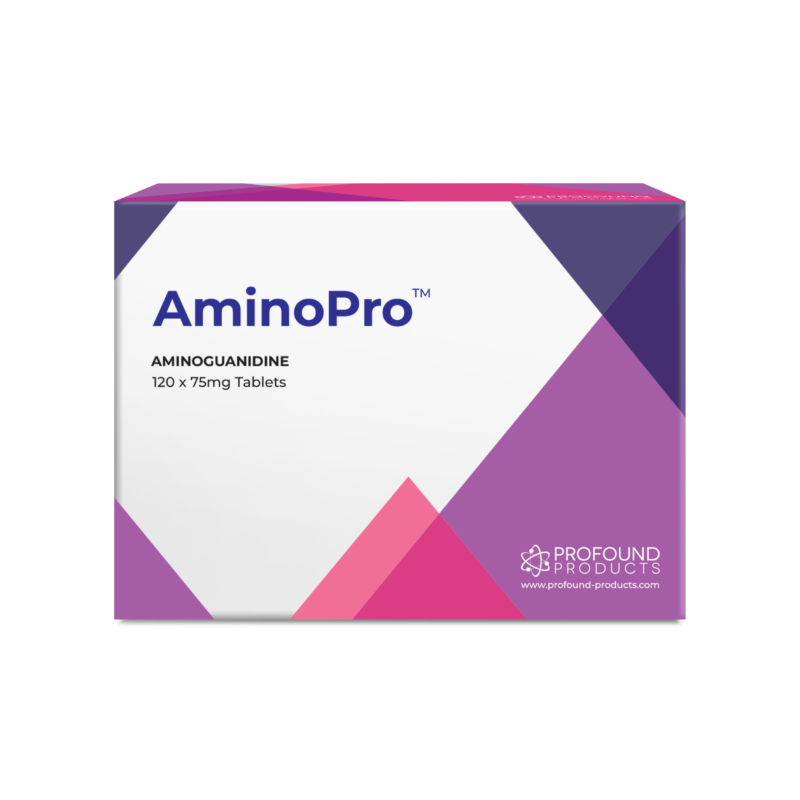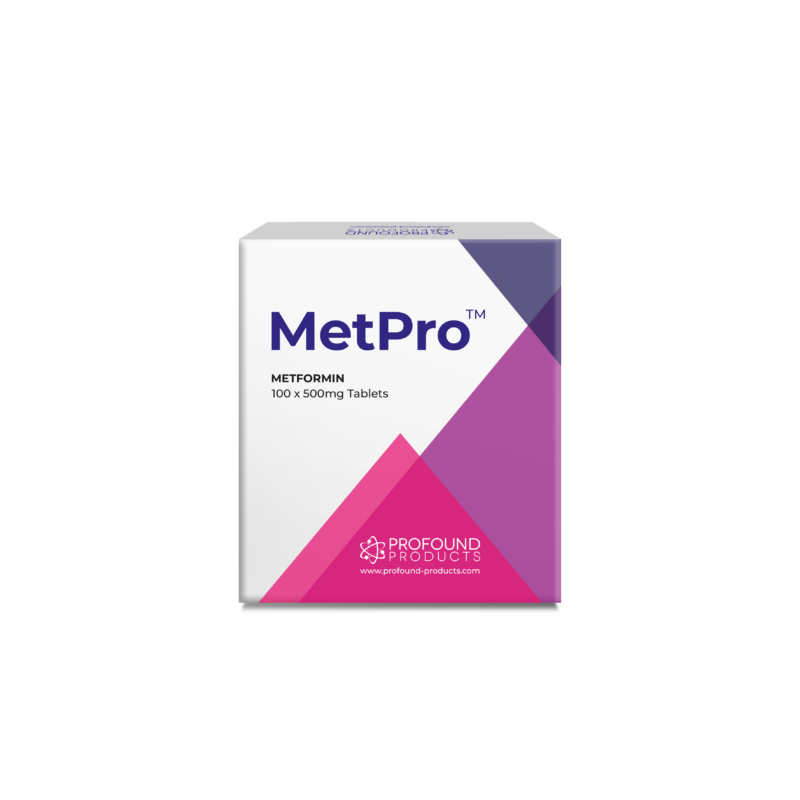
Aminoguanidine (AminoPro™)
World's most potent anti-age supplement
Aminoguanidine may have the potential to slow down the aging process and protect against key age-related conditions such as atherosclerotic disease (the hardening and narrowing of the arteries), by reducing bad cholesterol (or low density lipoprotein cholesterol).
This product features in the
following categories
This product has the
following ingredients
This product is associated with the following health conditions
Angina Antiaging Supplements ARMD (age related macular degeneration) Blood pressure Cardiovascular Conditions Cataract Chronic fatigue syndrome Diabetes Dieting Elevated Homocysteine Levels Excess Lipids Excessive Triglycerides in the Blood Eyesight Problems Heart, arterial & blood health conditions High Blood lipids High Cholesterol Hypertension Kidney Disorders Macular degeneration Skin Discoloration Skin problems Syndrome X (metabolic syndrome) Weight LossProduct Description
Can Aminoguanidine turn back the clock?
Some describe the aging process as akin to how a half eaten apple ages – through a process called Glycosylation (aka “cross-linking”), the fruit becomes toucher and turns yellow. This theory of cross-linking is thought to be the same as what happens to the proteins in our bodies as we age.
Aminoguanidine may have the potential to slow down this aging process and protect against other key age-related conditions.
Cross-linking and how it impacts aging
Cross-linking – also referred to as glycosylation – has long been seen as a culprit for many of ”old age ailments”, such as senile cataracts, some cancers, atherosclerotic disease, and general damage to the body’s immune system. As we already know, having a weakened immune system can increase our susceptibility to infection.
Looking at the cross-linking / glycosylation process in more detail – in particular the effects of glucose on the body – this also reveals important clues about cancer and how it develops in the body. Glycosylation itself is key to how proteins work in the body, as well as being instrumental in how white blood cells move around the body and initiate immune responses. However, as we age, the chemical changes within the body develop detrimental chemical bonds (“cross links”), such as when glucose binds to protein. The protein then becomes impaired and cannot perform efficiently, leading to various ill effects on the body.
In addition, the effects of glucose on our DNA can increase the likelihood of some cancers developing. The glucose reacts to produce damaged DNA, which in turn can lead to the production of abnormal, cancerous cells
Looking at the underlying process of cross-linking in relation to the aging process also reveals important clues for arterial and heart health. The aging process is associated with cardiac enlargement, arterial stiffening and Atherosclerotic disease, compounded by bad cholesterol / low density lipoprotein.
How does Aminoguanidine work?
Aminoguanidine works to actively protect the proteins from detrimental cross link binding and actually reverse the effects of cross linking on the body so far.
Combating Bad Cholesterol
Aminoguanidine may also help sufferers of “bad”, that is, low density lipoprotein cholesterol Bad cholesterol is called bad for a reason – when it circulates in your body, it can build up, causing thearteries to thicken and narrow. This can lead to a condition known as Atherosclerotic disease, not to mention an increased risk of heart problems and strokes.
The University of Milan have conducted extensive studies to demonstrate Aminoguanidine’s effectiveness in combating the impact of bad cholesterol. Aminoguanidine was found in tests on animals to restrict how low density lipoproteins bind to blood vessel walls. This process causes arteries to thicken over time, which in turn increases the risk of Atherosclerotic disease and related health problems. In turn, the essential component of blood known as platelets (they ensure that blood clots to stem bleeding) are less likely to coagulate and form dangerous blood clots in the body.
Protecting against Cardiovascular conditions
Aminoguanidine has also been shown to help protect against heart and associated arterial conditions linked with the aging process, such as age-related cardiac enlargement. One study on animals found that the drug reduced the membrane surface area of the heart by 30%. At the same time, the collagen content of the arterial walls was boosted by 24-30%. This points to Aminoguanidine’s effectiveness in relation to heart and arterial health, and as an ally in the fight against “bad” cholesterol low density lipoproteins.
The University of Milan have conducted studies that further demonstrate Aminoguanidine’s power in treating the debilitating condition of Atherosclerotic disease / Arteriosclerosis. During the study in 1992, 11 patients with peripheral arterial disease – whose blood vessels were so clogged that they were unable to walk more than 500 yards – were treated with Aminoguanidine. Afterwards, their blood flow improved by an average of 30%, while their exercise abilities were boosted by 50%
Slowing Down Aging
Aminoguanidine’s potential to slow down the aging process is one of the most exciting elements – by actively protecting the proteins in our body, including vital skin proteins collagen and elastin eye lenses, nerves and kidney proteins, Aminoguanidine reduces the risk of cross linking proteins with glucose and the subsequent adverse effects.
Sadly, all these key proteins deteriorate with age, particularly amongst diabetics, who typically have two to three times the number of cross-linked proteins than people without the condition.
Why are these proteins so important? Sadly, all of these key proteins deteriorate with age, leading to a range of adverse effects including wrinkles, eye problems, kidney problems etc. Diabetics may suffer earlier on as those with this condition typically have two to three times the number of cross-linked proteins than people without the condition. Research into Diabetes lends weight to the idea that cross-linking is a key factor behind the aging process, and Diabetes is often seen as a form of “accelerated aging”.
- Clinical studies involving Diabetic rats found that rats given Aminoguanidine had significantly superior survival rates to those who were untreated with the drug.
- Clinical trials involving humans pointed to Aminoguanidine’s effectiveness in preventing Oxidative modification of low density “bad” lipoprotein cholesterol, a bodily process that can lead to atherosclerosis and atherosclerotic disease.
Diabetes is just one of the conditions that we may face as we grow older, but by understanding the role that cross-linking plays in the aging process, we have powerful knowledge as an ally in our quest to tackle the problems associated with old age.
Aminoguanidine may provide a powerful defence against this process in our own bodies. It offers the potential to curb – or slow down – both the visible and invisible signs of aging. From a remedy for age-related toughening and yellowing of the skin, to cataract protection and arterial and heart health, Aminoguanidine is at the centre of our quest to tackle the impact of aging on our bodies.
Frequently Asked Questions About Aminoguanidine
Disclaimer: Please note that only your own physician can determine your precise needs, but in order to give you some information these answers are based upon the ‘average person’ and clinical / published results.
Question: My doctor and I are interested in the potential health benefits of Aminoguanidine and have a few questions. These are:
(1) Have independent assays been conducted by reputable, independent labs to ensure the purity and quality of Aminoguanidine?
(2) Would it be possible to get in touch with any other doctors who have been successfully using Aminoguanidine?
(3) Do you know of any new research on the use of Aminoguanidine to prevent optic nerve damage in glaucoma patients?
Yes, IAS conducts independent assays on all its custom made products and all batches are also received with certificates of analysis. As regards a doctor, perhaps Marios Kyriazis, M.D. is the best person to ask as he has both research and patient experience, although we are not aware of anything specific for optic nerve damage. Dr. Kyriazis can be reached via the British Longevity Society at www.thebls.org
Answer: Yes, IAS conducts independent assays on all its custom made products and all batches are also received with certificates of analysis.
As regards a doctor, perhaps Marios Kyriazis, M.D. is the best person to ask as he has both research and patient experience, although we are not aware of anything specific for optic nerve damage. Dr. Kyriazis can be reached via the British Longevity Society at www.thebls.org
Question: Our research group is interested in Aminoguanidine. We have learned from your article on the web that one derivative of Aminoguanidine (Pimagedine) is at stage III and another thiazolium salt derivative is at stage II trials in the USA. I would like to update my knowledge about Aminoguanidine, whether the formulae are in the markets already and whether the studies which you referred in your article are published. Any printed or electronical information would be very helpful for our intended research and scientific paper about it. I thank you in advance for your courtesy and cooperation.
Answer: The current position as I understand it is that Alteon (the US company conducting the Aminoguanidine and ALT-711), have decided to withdraw from the stage II trials etc. I believe their decision was based on a belief that both the substances were not as efficacious for the treatment of diabetes as they first thought, and that the extra cost of passing FDA approval was deemed unacceptable.
However, there are of course many of other benefits of these substances as described in our article and other articles about ‘glycosylation’ at the IAS website.
The majority of the studies mentioned in the article are published and should be obtainable through any major medical database such as Medline etc.
At present, IAS is able to offer Aminoguanidine as a ‘supplement’ in many countries and it remains of benefit to those with early stage diabetes and syndrome X for example.
Question: Can you give me any information comparing Aminoguanidine to L-Carnosine in terms of efficacy in eradicating cross linking, glycation reactions, etc.
Answer: As you may appreciate it is difficult to be precise to equate Aminoguanidine to L-Carnosine (in terms of their anti-glycation abilities), as to the best of our knowledge no direct comparison studies have been done.
What is interesting to note however, is that Aminoguanidine is an early-stage AGE inhibitor, whereas L-Carnosine is a late-stage AGE inhibitor; this could mean that Aminoguanidine prevents more inhibition than L-Carnosine, but that’s guesswork right now. Actually, we still recommend both – at reduced doses of course. Naturally there are other ‘proven’ benefits of Aminoguanidine that have not been shown with L-Carnosine.
More info here:
- https://www.antiaging-systems.com/articles/aminoguanidine-advanced-glycation-end-age-product-inhibitor/
- https://www.antiaging-systems.com/articles/the-crosslinkage-theory-of-aging/
How to take Aminoguanidine
Aminoguanidine Dosage
Take 75mg two, three of four times a day. Aminoguanidine has a half-life of approximately 4-hours, therefore it is preferable to spread the dosage over the day.
Possible Side effects
Possible nausea and headache. As human clinical trials are still relatively limited, dosages shouldn’t be exceeded unless under the supervision of a physician.
Caution
Aminoguanidine can inhibit the uptake of vitamin B6, so a B6 supplement is recommended whilst using Aminoguanidine, if you are using an older formula that does not contain this Aminoguanidine may be synergistic with Acarbose and Metformin.
AminoPro™: https://theantiaging.store/product/aminopro-aminoguanidine/
Please note
We supply a hydrochloride (HCL) based tablet. This is more expensive than a bicarbonate based version, but the HCL is more soluble, less irritating and is the type used in the clinical trials.
Aminoguanidine (AminoPro™) Testimonials
Aminoguanidine is one of the new drugs in a unique class called Advanced Glycation End product inhibitors which abbreviates to AGE-inhibitor. From the information that is coming to light in clinical trials, these novel drugs may prove to be just that – age inhibitors!
Phil Micans PharmB, Great Britain.
I’ve been waiting to try this new antiaging product for some time, congratulations on making it available.
D.C., New York.
I believe that whilst these anti protein cross-linking substances have benefits in many disorders that their true benefits will be in preventative medicine.
S.D., Malta.

